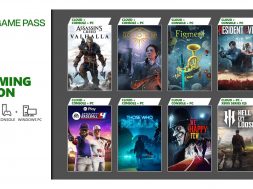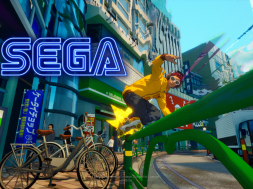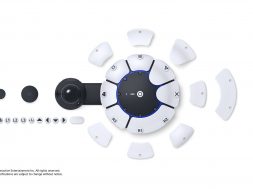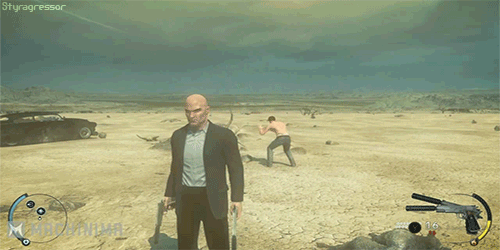
Marcus likes Hitman!
Hitman: Absolution‘s announcement was a slippery slope of excitement for me:
New Hitman game: Yay!
‘Improved’ gameplay mechanics: Hmm
No map, Instinct Mode: Oh dear…
Absolution went from a surefire pre-order for me, to something I only bought and played a few months down the line. I might not even have bought it then, had it not been on sale with some other Square Enix items. Even at that, I only started playing it after a discussion of how great some of the old Hitman levels were and I felt a hankering to jump back into the world of Agent 47. However, a few minutes after the first level started, I was hooked on the new style. Why the change of heart? Read on.
Hitman: Absolution is the 5th game in the series and the announcement of so many changes to the formula after 10 years filled me with trepidation, as I’m sure it did most fans. Thankfully, Absolution’s changes were mostly for the better. 10 years of almost unchanging mechanics can get stale after so long, no matter how tight they may be. Absolution was a great way to revitalise the series before that happened, and even though I still missed using maps to plan an attack, over the new ability to track enemies through walls, called Instinct, I have to agree that implementing Instinct made sense in context of the game’s story, as did many of the other changes.
In previous instalments of the series, Agent 47 had The Agency behind him. This gave him access to plenty of intel and equipment to use while planning. In Absolution, Agent 47 is operating outside of The Agency. As a result this intel and planning is done away with for the main story mode, although it is still present in Contracts Mode. Between the loss of the pre-mission planning, and the new Instinct abilities, there were a lot of changes to the formula and many people were unhappy with them. The thing is, there was no reason to miss them thanks to the introduction of Contracts Mode.
Contracts was a secondary gameplay mode, new to Absolution. It allowed players to take the existing levels and create their own custom objectives, then share them with other players all over the world or complete them privately as a personal challenge. Contracts added in all the planning that had been removed from Absolution’s story mode, and then some. Players could choose any actor in the level as the target, equip Agent 47 with any weapons or disguises they desired and then eliminate the target however they pleased. There was very little else that any fan of the series could have asked for. In my opinion, Contracts Mode was the Hitman experience distilled and many of the game’s detractors seem to forget it exists.
As I mentioned, the changes were all in keeping with the narrative and the new mechanics helped to sell the pressure and tension Agent 47 was under. I’m thankful for this, because the storyline featured in Absolution is easily the most involved of the whole series. For me, the only thing that comes close is the finale for Hitman 2: Silent Assassin, where 47’s existence puts the monastery he’d come to call home in danger. It was all very Spider-Man and I loved it, but it doesn’t quite put a patch on Absolution. The new story, rather than being a series of unconnected, contracted assassinations while 47 waits for more information to crop up, follows a more direct line as Agent 47 tries to protect a young girl from suffering the same fate as him: Becoming a walking experiment, created only for killing. The cherry on the cake is the emotional opening, where 47 is tasked with assassinating Diana Burnwood, his handler at The Agency. This was a big moment for players. Diana had been with 47 from the beginning, as she had been with the players for the last 10 years. It was a perfectly executed scene and, while the rest of the story explodes into the trademark Hitman madness that Sin City or Arrow fans will love, it was a brilliant opening to a new stage in the series, a clear sign that the designers knew the game was going to be different.
Criticism for Hitman: Absolution is mainly that it isn’t as open ended as other entries in the series. I’m not entirely sure what they mean by this. Yes, the pre-mission planning is gone, but really, that only removes a choice of what type of bullet to put in a target’s head. Even then, it’s only removed in Story Mode, and is even more customizable than ever in Contracts. If there’s one thing Absolution did infinitely better than previous games, it was give you new ways to kill. No other Hitman game gave so many options when it came to killing enemies with the environment. All the old ways are still there – Garrotte them with fibre wire, poison their food, lure them away and shoot them in the back, kill them from half a map away with a silenced sniper concealed in a briefcase – and they’ve added so much more – Close a piano on them, drop a car on them, turn on the gas and just walk quietly away, waiting for them to light a cigarette, or fight them in a cage match, luchador style. The possibilities are close to endless. It honestly boggles my mind that people would call this the more restrictive of the games, so I’ll say again, I have absolutely no clue what people meant when they called Absolution less open-ended than the rest of the series.
In summation, Hitman: Absolution is a somewhat different beast to the previous entries in the series, but while it may be different, it is in no way weaker than the rest. Did I miss watching the chaos of my attacks unfold from the map view? Yes. Did the many new mechanics make up for it? Double yes. Absolution has a selection of some of the best levels in the series, and that’s certainly saying something. It has a fantastic storyline and characters, both of which have bagfuls of that over-the-top Hitman style. It has Contracts which effectively gave the game endless different ways to play. It’s no great secret that gamers resist change, but there’s no good reason in my eyes to resist Hitman: Absolution as I did. Welcome it with open arms. Offer it a seat at the table. Drink the wine it brought as a gift. Pay no attention as goes to the bathroom and doesn’t return for 15 minutes. Have another glass of wine. Ignore that sleepy feeling.
Eoin doesn’t think Hitman: Absolution is great!
So first thing is first; Hitman is without a doubt one of my top ten favourite franchises. I first played Hitman 2: Silent Assassin back when it released in 2002 (Forgive my irresponsible parents) and have been hooked since. Blood Money was where the series had peaked until this new episodic format, but we’re here to talk about the dark horse; Absolution.
Now I don’t want to say I hate Hitman: Absolution. It’s not a completely bad game, it’s just an awful Hitman game. I’m going to do my best to articulate why in comparing what I consider the cream of the crop (Blood Money) to the slight misstep IO Interactive took with the series in 2012.
Absolution’s biggest problem is the one staring you in the face your entire way through the game: Live scoring.
https://www.playbuzz.com/thearcade10/is-hitman-absolution-a-good-game













